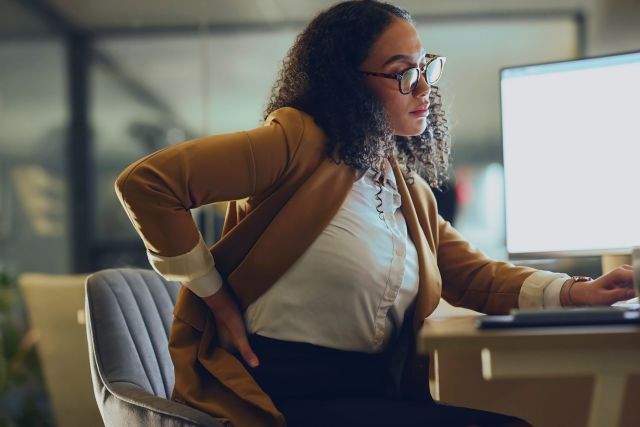Updated on August 17, 2023.
Back pain is widespread these days: Nearly 40 percent of all adult Americans have experienced back pain in the past three months, according to the CDC. The cause of all the ouch is often related to choices we make every day, in what we wear, how we communicate, and where we sit.
Learn more about these damaging back habits, plus some easy lifestyle tweaks for a healthier spine, from back and neck specialist, Sara Wilson, FNP, of West Valley Spine Center and West Valley Medical Center in Caldwell, Idaho.
Habit #1: Carrying a heavy bag
Whether you tote around a laptop, schoolbooks, or an extra-large bottle of water in your bag all day, all that extra weight is terrible for your back—especially if you carry it on one side. The added weight strains muscles and tendons in your back and neck, and over time can even lead to chronic pain and nerve damage.
Solution: Wilson recommends keeping your bag under 10 pounds, if possible, and taking a couple of minutes at the end of each day to clean it out so you're not carrying around unnecessary weight. If you’ve been carrying a bag that hangs over one shoulder, consider switching to a backpack or a crossbody bag, which distributes weight more evenly across your back and shoulders. If you decide to stick to a traditional purse, make sure you switch up the side you carry it on every few minutes.
Habit #2: Wearing high heels
Sky-high stilettos may look glam on TV or in the movies, but in real life, they can cause chronic pain in your back.
"When you wear high heels, it shortens the muscles in your legs," says Wilson. "Your foot is in an extended position, and that can actually shorten your calf muscle. That fatigue in your calves, thighs and feet from wearing these heels can cause back pain due to the change in posture and body mechanics." High heels also affect your body’s center of gravity, which puts extra pressure on your lower back muscles.
Solution: Wilson suggests sticking with heels no higher than two inches that have a wider heel base (as opposed to a stiletto). Also, switch it up. Instead of wearing heels every day, go for flats or boots to give your back—and feet—a break.
Habit #3: Sitting for too long
Spending long hours at your desk may be great for your career, but not so much for your back. Sitting for long periods of time puts pressure on the back, neck, shoulders, even the arms and legs, according to Wilson. "If you have pre-existing back problems, sitting increases compression on the nerves, causing more pain," she adds. Prolonged sitting also makes you more likely to slouch forward, which throws off posture and leads to back pain.
Solution: Remember to get up and stretch for three to five minutes every hour, says Wilson. You should also make sure the top of your monitor is at or slightly below eye level, so you're not straining your neck or upper back muscles looking at the screen.
Habit #4: Constantly using your cell phone
In our mobile world, it’s nearly impossible to avoid talking and texting on your phone. But constant cell phone use isn't good for your neck or your back. Here's why: The average adult head weighs 10 to 12 pounds when it's upright and in a neutral position. When it's bent all the way forward, like when we’re texting, the angle increases pressure (60 pounds worth!) thanks to gravity. And that forces the muscles in your neck and upper back to compensate, causing strain and pain.
"When we use our cell phones, we're either talking on them and trying to do too many things at once—so our head is bent to the shoulder—or we're texting," says Wilson. "When we text, we flex our head and neck forward in an unnatural position."
Solution: Most of us aren't going to give up talking or texting anytime soon, so make sure you’re being mindful of how you're sitting or standing when you do. Putting the phone on speaker or using ear buds while you talk can also keep your head in an upright, more comfortable position.
Get a better back
If you’re still bothered by twinges and aches in your back, pay attention to your posture and work on strengthening your core, Wilson suggests. "If we have strong core muscles, we have better posture and are less likely to slouch,” she adds.







